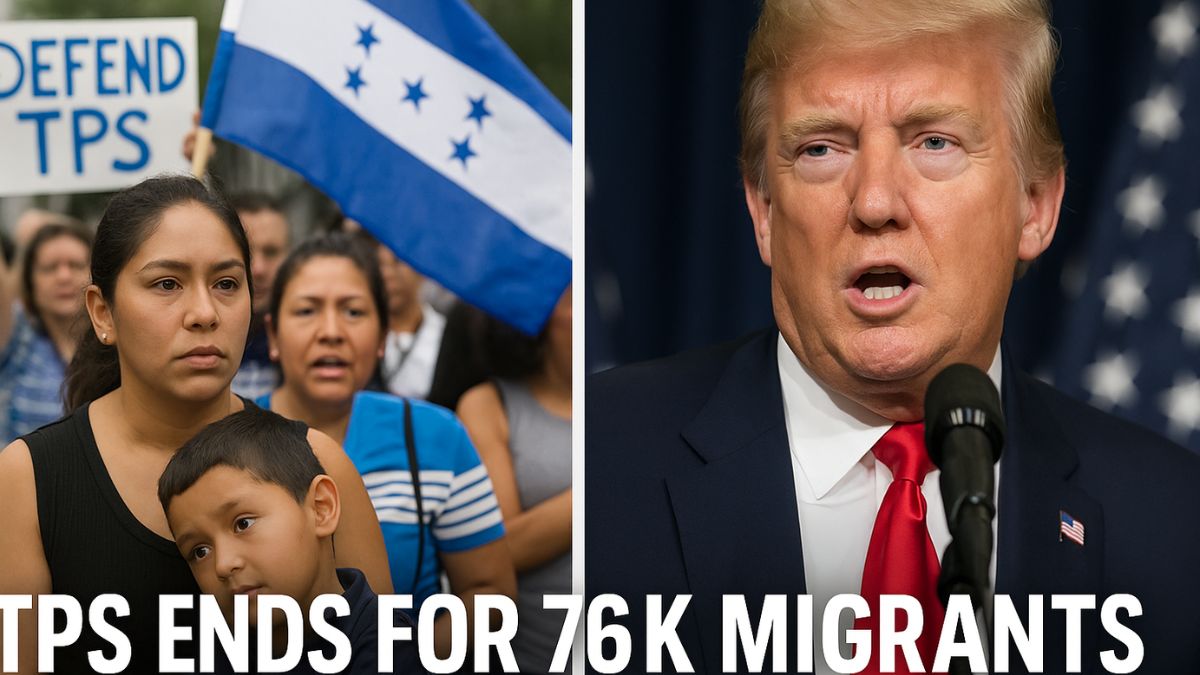New York: The U.S. government has officially ended TPS for Honduras and Nicaragua, stripping more than 76,000 immigrants of their legal protections and work authorization. The Department of Homeland Security (DHS) made the announcement on Sunday, July 6, 2025, setting a September deadline for affected individuals to either adjust their status or leave the country.
This decision ends a humanitarian policy that had been in place since 1999, following the devastation of Hurricane Mitch. At its core, Temporary Protected Status (TPS) allowed eligible nationals from Honduras and Nicaragua to remain in the United States while their home countries recovered from the natural disaster.
Now, with the Trump administration pursuing the largest mass deportation campaign in U.S. history, many TPS recipients — often referred to as “tps hondureños” in community circles — are facing uncertainty, legal confusion, and potential separation from their U.S.-born children.
NEWS: The Trump administration is terminating two other TPS programs, announcing it will revoke the legal status of roughly 76,000 immigrants from Honduras and Nicaragua in 2 months.
They will be at risk of deportation in early September unless they have another status.
— Camilo Montoya-Galvez (@camiloreports) July 7, 2025
Also Read: Russian Minister Roman Starovoit Found Dead After Putin Fires Him
DHS ends Temporary Protected Status (TPS) for Honduras and Nicaragua, impacting 76,000 immigrants legally residing in the U.S. since the 1990s.
Migrants lose TPS by September 2025 unless they qualify for another legal path.
The move is part of a broader Trump administration rollback of humanitarian protections, including Haiti TPS.
What Is TPS and Why Was It Created?
Temporary Protected Status (TPS) is a form of humanitarian relief granted by the U.S. government to nationals of countries experiencing ongoing armed conflict, environmental disasters, or extraordinary conditions. Since its introduction in 1990, TPS has protected thousands from deportation.
TPS for Honduras was first granted in 1999 due to the catastrophic impact of Hurricane Mitch. Similarly, TPS for Nicaragua was established in response to the same disaster. The status has been renewed repeatedly through extensions, with advocates arguing that both countries still face instability, corruption, and weak infrastructure.
However, according to recent guidance from the U.S. Citizenship and Immigration Services (USCIS), conditions have now “sufficiently improved.” Critics argue that this decision ignores widespread poverty, violence, and lack of economic opportunity in both nations.
How Many People Lose Protection Under the TPS Termination?
According to data from USCIS and official DHS notices:
- 72,000 Hondurans
- 4,000 Nicaraguans
…will lose their TPS following the final extension deadline in 2026. These individuals have legally lived in the United States for over 25 years, many raising families and contributing to essential industries.
Their TPS work permits and deportation protections will expire unless they transition to another immigration category. Some may qualify for family-based green cards or asylum, but options remain limited.
What’s Next for TPS Holders from Honduras and Nicaragua?
DHS has stated that it will assist with voluntary repatriation, offering support through the CBP One app, including:
- A free return flight
- A $1,000 exit incentive
- Legal counseling in select cities
However, immigration lawyers warn that this “orderly departure” approach fails to account for the emotional and financial disruption families will face. Many recipients have lived in the U.S. for decades, with deep roots in their communities.
Spanish-language media has been flooded with tps noticias, and migrants are scrambling to understand their rights. Calls to immigration hotlines and USCIS support centers have surged since the announcement.
Will Legal Action Delay Deportations?
Legal challenges are already in motion. Immigrant rights groups and several Democratic lawmakers argue the move violates humanitarian commitments.
While Haiti TPS termination was temporarily blocked in court last year, the U.S. Supreme Court’s May 2025 ruling on Venezuelan TPS cleared the path for future terminations. That ruling has made it more difficult for Honduran and Nicaraguan TPS holders to win injunctions.
As of now, TPS for Honduras will not be extended beyond 2026, a fact confirmed in DHS documentation and USCIS announcements.
Why It Matters Beyond Immigration
This TPS decision has broader national and economic implications:
- Economically: Losing tens of thousands of TPS workers may hurt industries like construction, hospitality, and elder care.
- Socially: Families may be split, with U.S.-born children left behind.
- Politically: The decision underscores Trump’s hardline immigration stance ahead of the 2026 midterms.
Senator Catherine Cortez Masto (D-Nev.) criticized the termination, saying it will “hurt U.S. businesses and tear families apart.”







